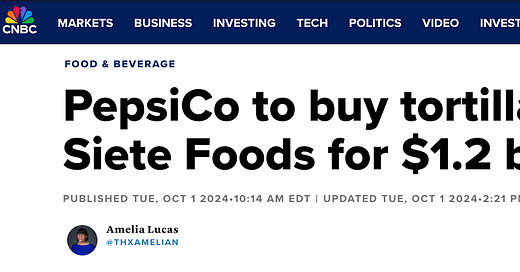Outrage Follows Siete Foods Acquisition by PepsiCo: Narrative Risks in Corporate Acquisitions
New Today: Big Food Concerns Spoil Successful Exit for Family-Built Business
Welcome to Detect, Decipher, Defend with PeakMetrics—your go-to resource for navigating brand reputation challenges. Explore recent case studies and learn how to detect, decipher, and defend against emerging narrative threats to win the week. Let’s dive in!
Siete Foods made headlines this month, as PepsiCo acquired the Texas-based, family-owned brand in a $1.2 billion deal. Austin-based Siete Foods markets itself as a health-conscious Mexican American food company with roots in South Texas, founded by the Garza family in 2014. The company drew a loyal customer base selling grain-free tortilla chips, enchilada sauces, taco seasonings, botana sauces, cookies, beans, and salsas — popular with consumers with food allergies and dietary restrictions.
As consumer awareness grows of the health risks of ultra-processed foods, many Siete customers were alarmed by the company’s acquisition by Big Food giant, PepsiCo. These concerns were amplified by some right-wing online influencers, as outrage about the acquisition started to veer into conspiracy-laden territory involving chemicals, the food supply, immunity, and corporate power networks.
With PeakMetrics, companies can detect narrative risks as they emerge around big corporate announcements, decipher particularly risky narratives, and defend against possible conspiracy-laden misinformation related to their brand.
Our “Detect. Decipher. Defend.” Framework
Detect:
PeakMetrics detected the volume of mentions about the acquisition of Siete Foods by PepsiCo reached 3,551 mentions across news and social media, with peak days on October 2nd-3rd, showing a significant spike in interest and coverage.
Discussions primarily revolve around the impact of PepsiCo's acquisition strategy, with some concerns that it may affect the quality of Siete Foods' products negatively. This is evident from comments like "Pepsi will ruin the brand" and concerns over sourcing "cheap ingredients." PeakMetrics found that local reporting was more likely to be negative toward the acquisition. For example, the Texas-outlet My San Antonio, noted concerns from the brand’s loyal health-conscious and Mexican-American customer base that the brand would lose its distinctive approach to ingredients and quality.
Decipher:
PeakMetrics narrative intelligence technology distilled several key concerns echoed by consumers online, including:
Ingredient Quality: A top concern voiced by consumers related to Siete’s grain-free and seed oil-free branding. Users worried that the acquisition by PepsiCo would lead to a compromise on using these types of quality ingredients, such as almond flour and avocado oil. This was a particular concern for users who rely on Siete Foods because of food allergies, including sensitivities to gluten.
The r/Celiac and r/PlantBasedDiet subreddits were one place where these concerns were shared. Users called Siete their “safe food” and wanted to continue monitoring if the gluten-free certification of their products changed following the acquisition.
Big Food: Several celebrities and online influencers weighed in on Siete’s acquisition, amplifying concerns about the brand being acquired by “Big Food” giant PepsiCo. Notably, Mike Cernovich and Rob Schneider both posted on X (Twitter) responding negatively to the acquisition, with posts amassing ~200k views. Concerns about Big Food can veer into misinformation-laden territory, as evidenced by Schneider’s repost from an account on “natural immunity.”
BlackRock Conspiracy: Traveling further into the realm of misinformation surrounding the acquisition, PeakMetrics uncovered a narrative claiming that Siete’s acquisition by Pepsi was influenced by the giant money manager, BlackRock. BlackRock has cropped up in a wide range of conspiracies in recent years, with Internet users from both the far-left and far-right claiming the company secretly controls the world. The original post spreading this concern came from an account called Think Before You Sleep (@TBYSTweet) — which has 25k followers on X (Twitter). This account shared the same original post that Mike Cernovich and Rob Schneider reacted to, but took this narrative on step further into conspiracy-rich territory by referencing BlackRock.
Defend:
For Siete Foods and PepsiCo, the PeakMetrics platform identified these three angles to counter negative narratives and combat misinformation related to the acquisition.
Respond to Quality Concerns: Address the fears about quality decline post-acquisition by reassuring stakeholders about PepsiCo's commitment to maintaining the high standards of Siete Foods, including concerns related to gluten and seed oils for the health-conscious and allergy-sensitive customer base. Highlight PepsiCo's strategic intent to promote healthier snack options, as demonstrated by this acquisition. Consider leveraging key influencers or partners in the allergy and gluten-free communities to attest to the quality of Siete’s ingredients under the PepsiCo brand.
Market to Key Platforms: Target advertising on platforms like Twitter and Reddit to address misinformation and engage with concerned consumers. Sub-reddits and other micro-communities offer an inroad to Siete’s loyal customer base, including r/Celiac and r/PlantBased Diet.
Monitor Misinformation: Keep a close eye on claims related to “Big Food” conspiracy theories impacting the Siete and PepsiCo brands, including the specific claim PepsiCo is owned by Blackrock — a company tied to a vast number of conspiracy theories about corporate governance, anti-Semitism, and shadow power. Monitor the escalation of these conspiracies from right-wing influencers.
The latest news & insights from the PeakMetrics team.






